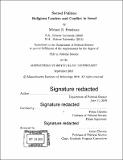Sacred politics : religious leaders and conflict in Israel
Author(s)
Freedman, Michael R.(Michael Raphael)
Download1144176792-MIT.pdf (12.88Mb)
Alternative title
Religious leaders and conflict in Israel
Other Contributors
Massachusetts Institute of Technology. Department of Political Science.
Advisor
Fotini Christia, Richard Nielsen, and Guy Grossman.
Terms of use
Metadata
Show full item recordAbstract
My dissertation examines why religious leaders adopt nationalist positions and how these positions contribute to the duration of an ongoing conflict. I propose a general framework of sacred politics that incorporates the state, religious leaders, and religious communities. Within this framework, I develop a theory of religious credibility that explains the variation in religious leader ideology through examining leaders' incentives to strategically adopt ideological positions and the network of religious institutions. I test these hypotheses in Israel using a combination of methods including statistical text methods that analyze religious communication of different religious leaders, spatial panel data showing the electoral impact of religious institutions, and a novel experimental design where I vary the credibility of religious leaders using religious sermons. This dissertation offers significant social science contributions as it offers an account of why religious leaders adopt moderate and extreme ideologies. They also give insight into the reasons why some religious leaders cooperate with the state, why this cooperation is crucial for the termination of conflict, and the influence that religious leaders have on the political behavior of their followers. Outside of scholarly literatures, the dissertation offers important findings for policy-makers seeking to understand and include religious leaders in development and peace-building processes.
Description
Thesis: Ph. D., Massachusetts Institute of Technology, Department of Political Science, 2019 Cataloged from PDF version of thesis. Includes bibliographical references (pages 165-176).
Date issued
2019Department
Massachusetts Institute of Technology. Department of Political SciencePublisher
Massachusetts Institute of Technology
Keywords
Political Science.